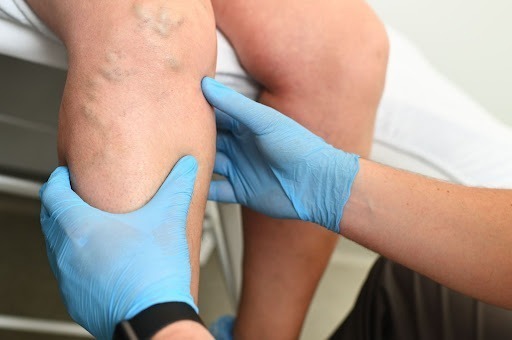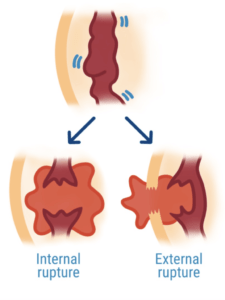Varicose Veins
What Happens When a Varicose Vein Pops?

by admin
13th September 2023
9 minutes read
Having varicose veins can be painful and unsightly, but can varicose veins can pop or burst? The answer is Yes! – Varicose veins tend to burst and rupture, and the popping of varicose veins is a medical emergency that should not be ignored. If you have varicose veins, it becomes important to understand the causes of their rupture to prevent it. Let’s read on to know more.
Why Do Varicose Veins Pop?
Varicose veins are twisted, engorged and thickened veins visible on the skin. These are caused due to improper functioning of the valves of the veins of your leg or ankle. Veins carry blood to the heart from various parts of the body, and arteries carry blood from the heart to supply to different body parts.
When we walk or exercise, our muscles contract, and due to the pump action, the blood is returned to the heart against gravity. The elastic vein walls help return blood to the heart through the tiny valves present in these veins. These valves open as the blood flows towards the heart and close when the action is complete (to stop more blood from flowing towards the heart).
If these valves become damaged, faulty or weak, blood starts flowing backwards and pooling in the veins causing the veins to stretch and become bulged, twisted and engorged with blood. As the veins lie superficial to the skin, they are visible externally as a thin red string or twisted rope-like thickened areas under the skin surface, depending on the blood the vein carries. These are called varicose veins. These are mostly seen in the body’s lower extremities- leg and ankle. If left untreated, the swelling in the veins increases, making the vessel wall weak. This exerts pressure on the surrounding tissue, leading to bursting, popping or exploding of the varicose veins . A ruptured varicose vein may bleed into the tissues and through the skin surface. Even a minor trauma like brushing against a sharp object or scrubbing the area during a bath may cause rupture of the already swelled up veins.
What Are the Risk Factors For a Varicose Vein to Pop?
Normally, varicose veins do not pop if treated on time, but certain factors can put you at risk:
- Obesity – If you are overweight or obese, the risk increases as the abdominal pressure puts additional stress on the veins of your legs, causing the vein to pop.
- Age – as you grow old, your body may not be able to regulate the blood flow, leading to weakened valves in the vein, thereby making the vein prone to rupture.
- Family history– If you have a family history of being born with weakened valves of the veins in the leg or ankle, then it puts you at risk of rupture of the veins.
- Pregnancy– The risk of popping of veins is higher when pregnant because of the increased weight during this time and the action of the hormones on the body.
- Strenuous exercises– If you are in a profession that involves continuous standing or sitting for long periods without breaks or are involved in activities like running or jumping, you may be at a higher risk, as these activities will put extra pressure on your legs and veins, causing them to burst.
- Smoking– If you are a regular smoker, the toxins in the cigarette can damage the arteries and veins of the body, putting you at risk of popping the varicose veins.
- Alcohol– Consuming large amounts of alcohol causes dehydration which can impact the walls of the veins, making them weak and prone to bursting.
What Symptoms Are Experienced When The Varicose Vein Pops?
The symptoms are different when there is an internal rupture of the veins compared to the external rupture of the varicose veins
Internal rupture– This occurs when the wall of the varicose veins ruptures, but the skin does not break (remains intact). The veins bleed into the surrounding tissue, which causes a burning sensation, bruising under the skin, dizziness and fainting. If these symptoms are present, it is advisable to go to the emergency unit of the nearby hospital immediately to prevent complications like blood loss and permanent damage to the veins.
External rupture occurs when the wall of the varicose veins and the skin ruptures together. External rupture is mostly caused by physical trauma to the veins, such as a cut or hit from a sharp object. In this case, severe bleeding occurs and must be stopped immediately to prevent blood loss. It is a medical emergency and has to be treated at the hospital. Immediate treatment to stop the bleeding at home should be attempted as it is life-saving.
What Are The Signs When The Varicose Vein Pops?
There are a few signs that are seen by your doctor on examination to reach a diagnosis of burst varicose veins.
- Pain – The area where the vein has popped is very tender. You will experience extreme pain when your doctor touches it.
- Swelling – The area around the popped varicose vein is swelled up due to the accumulation of fluids (a sign of inflammation)
- Bruising– The area around the popped vein becomes black or blue. This happens due to the leakage of blood into the tissue which causes the discoloration.
- Redness– The affected area of the popped vein can turn red. The redness may vary according to the severity of the varicosity of the vein, movements of your limbs or the pressure applied to that area.
- Inflammation – This is your body’ protective response to any foreign substances. This defence mechanism is for healing the body and fighting against the bacteria and viruses that have entered your body.
How to Stop The Bleeding From Varicose Veins at Home?
- Apply pressure to the popped vein site- If the vein has burst and there is bleeding, you must apply direct pressure on the vein to stop the bleeding. Use a clean cloth, towel or gauze and apply pressure to the site. This helps stop the bleeding and prevents infection until medical assistance arrives.
- Elevate the leg- After applying pressure on the bleeding site, you can elevate the affected leg above the level of your heart. This helps reduce swelling, decrease pain, improve circulation, and prevents further blood loss.
- Get Medical Help- Call the ambulance or go the nearby emergency unit of a hospital for treatment.
Why is an Emergency Management Needed For a Popped Varicose Vein?
Emergency management of a popped vein that has ruptured (internally or externally) is advisable as it can lead to excessive loss of blood and may also cause the development of serIous medical conditions like deep vein thrombosis (DVT) or pulmonary embolism (PE). Deep vein thrombosis is a condition that occurs when a blood clot is formed in the veins of the legs. This is a medical emergency as the blood clot can detach and travel through the bloodstream into the lungs and cause blockage in the lungs, a condition known as. PE This causes interruption in the blood supply to the lungs which can be fatal.
How is Popped Varicose Vein Managed?
A popped vein is managed in the emergency room. A vascular surgeon (doctor who specializes in arteries and veins) will guide you on the treatment based on the type and severity of the rupture.
Surgical management is the only option for treatment if the vein has ruptured externally and you are bleeding. If there is an internal rupture, the doctor will first manage the constion conservatively and then plan for s surgery at a later date.
Conservative management is advised when the rupture is internal and is less severe. Your doctor may examine the ruptured vein and may:
- Prescribe oral medications like blood thinners, antibiotics and anti-inflammatory drugs to manage the condition presently. When the inflammation has settled down, your doctor may advise surgical management
- Advise compression stockings- You will be asked to wear compression stockings as a part of the treatment- this helps in providing pressure on the affected vein, improving the circulation and reducing the pain and swelling.
Surgical management can be divided into emergency management and elective management for popped veins
- Emergency management of externally ruptured vein- In the emergency, you will be made to undergo a complete evaluation (blood tests, ultrasound venous doppler, other imaging tests) to check for the cause of rupture. Then an ultrasound guided sclerotherapy will be performed which collapses the lining of the vein, thus preventing firther blood loss. Endovenous laser treatment is another method to seal the veins.
- Elective management of of internally ruptured vein – Few days or weks the conservative treatment, your surgeon will plan the removal or treatment of the affected varicose vein. Different methods that can be used are- endotheramal ablation, ultrasound guided foam scelortherapy, ligation and stripping of the affected vein, trnasilluminated phlebectomy or cyanoacrylate glue occlusion.
How to Prevent Varicose Veins From Popping?
If you have varicose veins, it is neccessary to take measures to prevent it from bursting or popping. Some of the preventive measures include:
- Get the varicose vein treated by sclerotherapy, laser treatment or surgival removal (liagation and stripping)
- Avoid sitting or standing for long durations to avoid building up of pressure in the veins.
- Keep your legs elevated while sitting to avoid pooling of blood in the veins.
- Eat a nutritious and a healthy diet that does not increase your weight.
- Exercise regularly for 30 minutes, 5 times a week to keep your weight in check.
- Waer compression stockings for relief from pain and swelling.
Popping of varicose veins is an emergency and can cause blood loss and put you at a risk for developing DVT and PE is not treated timely. As the saying goes “prevention is better than cure”- it is best advised to prevent the varicose veins from popping by following a healthy lifestyle and your doctors advice. Our vascular surgeons at Medfin are well- equipped in treating and managing varicose veins. Contact us to know more about the popped varicose veins and its management.
CATEGORIES
- ACL Reconstruction
- Anal Fissures
- Anal Fistula
- Appendicitis
- ASK A DOCTOR
- Benign Prostatic Hyperplasia
- Breast Lump Excision
- Cataract
- Circumcision
- Conditions & Diseases
- Cosmetology
- Covid-19
- Cure
- Endocrinology
- ENGLISH VIDEOS
- Eye Care
- Gallstones
- General Surgeries
- Government Schemes
- Gynaecology
- Gynecomastia
- Gynecomastia
- Health
- Health Insurance
- Hernia
- hindi
- Hip Arthoscopy
- Hip Replacement
- Hip Replacement Surgery
- Hydrocele
- Kannada
- Kidney Stones
- Knee Arthroscopic
- Laparoscopic
- LASER
- Latest Treatments
- Lifestyle
- Liposuction
- Medfin Stories
- Medicine
- Nephrology
- Ophthalmology
- Orthopaedic
- Paraphimosis
- Patient Testimonials
- PCL Reconstruction
- Phimosis
- Piles (Hemorrhoids)
- Pilonidal Sinus
- Proctology
- Prostate Artery Embolization
- Rhinoplasty
- Second Opinion
- Total Knee Replacement
- Uncategorised
- Urology
- uterine artery embolization
- Uterine Fibroids
- Varicocele
- Varicose Veins
- Vascular
- VIDEOS






